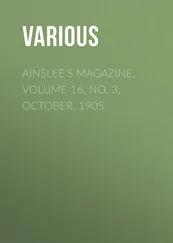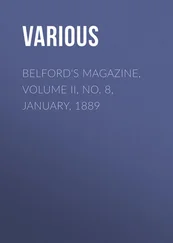Various - Donahoe's Magazine, Volume 15, No. 1, January 1886
Здесь есть возможность читать онлайн «Various - Donahoe's Magazine, Volume 15, No. 1, January 1886» — ознакомительный отрывок электронной книги совершенно бесплатно, а после прочтения отрывка купить полную версию. В некоторых случаях можно слушать аудио, скачать через торрент в формате fb2 и присутствует краткое содержание. Издательство: Иностранный паблик, Жанр: foreign_antique, periodic, foreign_edu, на английском языке. Описание произведения, (предисловие) а так же отзывы посетителей доступны на портале библиотеки ЛибКат.
- Название:Donahoe's Magazine, Volume 15, No. 1, January 1886
- Автор:
- Издательство:Иностранный паблик
- Жанр:
- Год:неизвестен
- ISBN:нет данных
- Рейтинг книги:3 / 5. Голосов: 1
-
Избранное:Добавить в избранное
- Отзывы:
-
Ваша оценка:
- 60
- 1
- 2
- 3
- 4
- 5
Donahoe's Magazine, Volume 15, No. 1, January 1886: краткое содержание, описание и аннотация
Предлагаем к чтению аннотацию, описание, краткое содержание или предисловие (зависит от того, что написал сам автор книги «Donahoe's Magazine, Volume 15, No. 1, January 1886»). Если вы не нашли необходимую информацию о книге — напишите в комментариях, мы постараемся отыскать её.
Donahoe's Magazine, Volume 15, No. 1, January 1886 — читать онлайн ознакомительный отрывок
Ниже представлен текст книги, разбитый по страницам. Система сохранения места последней прочитанной страницы, позволяет с удобством читать онлайн бесплатно книгу «Donahoe's Magazine, Volume 15, No. 1, January 1886», без необходимости каждый раз заново искать на чём Вы остановились. Поставьте закладку, и сможете в любой момент перейти на страницу, на которой закончили чтение.
Интервал:
Закладка:
Various
Donahoe's Magazine, Volume 15, No. 1, January 1886
Encyclical Letter
OF OUR MOST HOLY LORD LEO XIII., BY DIVINE PROVIDENCE POPE,
To all the Patriarchs, Primates, Archbishops and Bishops of the Catholic World, in the Grace and Communion of the Apostolic See,
LEO PP XIII
Venerable Brethren, Health and Apostolic Benediction.
The work of a merciful God, the Church looks essentially, and from the very nature of her being, to the salvation of souls and the winning for them of happiness in heaven, nevertheless, she also secures even in this world, advantages so many and so great that she could not do more, even if she had been founded primarily and specially to secure prosperity in this life which is worked out upon earth. In truth, wherever the Church has set her foot she has at once changed the aspect of affairs, colored the manners of the people as with new virtues and a refinement unknown before—as many people as have accepted this have been distinguished for their gentleness, their justice, and the glory of their deeds. But the accusation is an old one, and not of recent date, that the Church is incompatible with the welfare of the commonwealth, and incapable of contributing to those things, whether useful or ornamental, which, naturally and of its own will, every rightly-constituted State eagerly strives for. We know that on this ground, in the very beginnings of the Church, the Christians, from the same perversity of view, were persecuted and constantly held up to hatred and contempt, so that they were styled the enemies of the Empire. And at that time it was generally popular to attribute to Christianity the responsibility for the evils beneath which the State was beaten down, when in reality, God, the avenger of crimes, was requiring a just punishment from the guilty. The wickedness of this calumny, not without cause, fired the genius and sharpened the pen of Augustine, who, especially in his Civitate Dei , set forth so clearly the efficacy of Christian wisdom, and the way in which it is bound up with well-being of States, that he seems not only to have pleaded the cause of the Christians of his own time, but to have triumphantly refuted these false charges for all time. But this unhappy inclination to complaints and false accusations was not laid to rest, and many have thought well to seek a system of civil life elsewhere than in the doctrines which the Church approves. And now in these latter times a new law, as they call it, has begun to prevail, which they describe as the outcome of a world now fully developed, and born of a growing liberty. But although many hazardous schemes have been propounded by many, it is clear that never has any better method been found for establishing and ruling the State than that which is the natural result of the teaching of the Gospel. We deem it, therefore, of the greatest moment, and especially suitable to our Apostolic function, to compare with Christian doctrine the new opinions concerning the State, by which method we trust that, truth being thus presented, the causes of error and doubt will be removed, so that each may easily see by those supreme commandments for living, what things he ought to follow, and whom he ought to obey.
It is not a very difficult matter to set forth what form and appearance the State should have if Christian philosophy governed the commonwealth. By nature it is implanted in man that he should live in civil society, for since he cannot attain in solitude the necessary means of civilized life, it is a Divine provision that he comes into existence adapted for taking part in the union and assembling of men, both in the Family and in the State, which alone can supply adequate facilities for the perfecting of life . But since no society can hold together unless some person is over all, impelling individuals by efficient and similar motives to pursue the common advantage, it is brought about that authority whereby it may be ruled is indispensable to a civilized community, which authority, as well as society, can have no other source than nature, and consequently God Himself. And thence it follows that by its very nature there can be no public power except from God alone. For God alone is the most true and supreme Lord of the world, Whom necessarily all things, whatever they be, must be subservient to and obey, so that whoever possess the right of governing, can receive that from no other source than from that supreme chief of all, God. " There is no power except from God. " (Rom. xiii. 1.) But the right of ruling is not necessarily conjoined with any special form of commonwealth, but may rightly assume this or that form, provided that it promotes utility and the common good. But whatever be the kind of commonwealth, rulers ought to keep in view God, the Supreme Governor of the world, and to set Him before themselves as an example and a law in the administration of the State. For as God, in things which are and which are seen, has produced secondary causes, wherein the Divine nature and course of action can be perceived, and which conduce to that end to which the universal course of the world is directed, so in civil society He has willed that there should be a government which should be carried on by men who should reflect towards mankind an image as it were of Divine power and Divine providence. The rule of the government, therefore, should be just and not that of a master but rather that of a father, because the power of God over men is most just and allied with a father's goodness. Moreover, it is to be carried on with a view to the advantage of the citizens, because they who are over others are over them for this cause alone, that they may see to the interests of the State. And in no way is it to be allowed that the civil authority should be subservient merely to the advantage of one or of a few, since it was established for the common good of all. But if they who are over the State should lapse into unjust rule; if they should err through arrogance or pride; if their measures should be injurious to the people, let them know that hereafter an account must be rendered to God, and that so much the stricter in proportion as they are intrusted with more sacred functions, or have obtained a higher grade of dignity, " The mighty shall be mightily tormented. " (Wisd. vi. 7.)
Thus truly the majesty of rule will be attended with an honorable and willing regard on the part of the citizens; for when once they have been brought to conclude that they who rule are strong only with the authority given by God, they will feel that those duties are due and just, that they should be obedient to their rulers, and pay to them respect and fidelity, with somewhat of the same affection as that of children to their parents. " Let every soul be subject to higher powers. " (Rom. xiii. 1.)
Indeed, to contemn lawful authority, in whatever person it is vested, is as unlawful as it is to resist the Divine will; and whoever resists that, rushes voluntarily to his destruction. " He who resists the power, resists the ordinance of God; and they who resist, purchase to themselves damnation. " (Rom. xiii. 2.) Wherefore to cast away obedience, and by popular violence to incite the country to sedition, is treason, not only against man, but against God.
It is clear that a State constituted on this basis is altogether bound to satisfy, by the public profession of religion, the very many and great duties which bring it into relation with God. Nature and reason which commands every man individually to serve God holily and religiously, because we belong to Him and coming from Him must return to Him, binds by the same law the civil community.
Читать дальшеИнтервал:
Закладка:
Похожие книги на «Donahoe's Magazine, Volume 15, No. 1, January 1886»
Представляем Вашему вниманию похожие книги на «Donahoe's Magazine, Volume 15, No. 1, January 1886» списком для выбора. Мы отобрали схожую по названию и смыслу литературу в надежде предоставить читателям больше вариантов отыскать новые, интересные, ещё непрочитанные произведения.
Обсуждение, отзывы о книге «Donahoe's Magazine, Volume 15, No. 1, January 1886» и просто собственные мнения читателей. Оставьте ваши комментарии, напишите, что Вы думаете о произведении, его смысле или главных героях. Укажите что конкретно понравилось, а что нет, и почему Вы так считаете.












